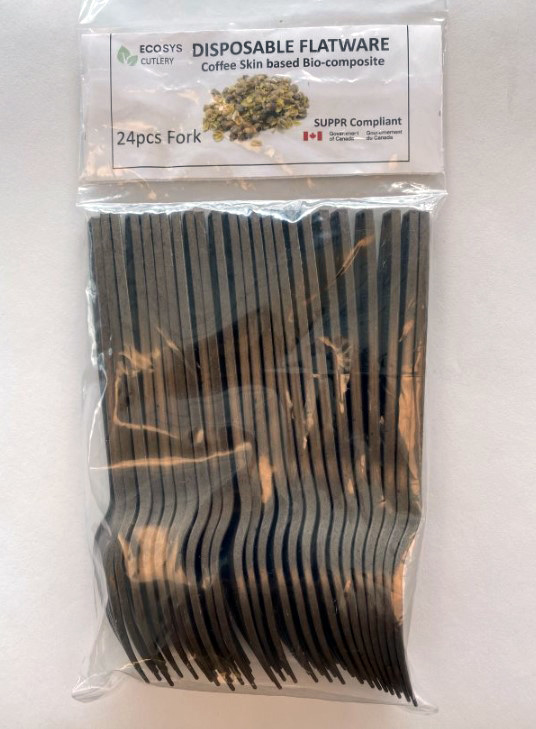
As Ottawa moves to ban several kinds of single-use plastics, new eco-friendly cutlery developed through University of Guelph research will soon be available at several major fast-food chains across Canada.
A new line of knives, forks and spoons being introduced this year is intended to reduce plastic waste and lessen the carbon footprint of the hospitality industry. As well, U of G-derived compostable coffee stir sticks are now being sold in Italy.
In Canada, the new products comply with federal single-use plastic prohibition regulations.
Both product lines are made of waste coffee material and biopolymers in a certified industrially compostable biocomposite resin recently created by researchers in U of G’s Bioproducts Discovery and Development Centre (BDDC).
“We are turning coffee bean skins into cutlery,” said Dr. Amar Mohanty, BDDC director and a professor cross-appointed in the Department of Plant Agriculture within the Ontario Agricultural College (OAC) and the School of Engineering in the College of Engineering and Physical Sciences. He also holds the OAC Distinguished Chair in Sustainable Biomaterials. “We want to reduce dependence on fossil polymers and waste plastics and the amount of carbon going into the atmosphere.”
Compostable food-service items made from coffee bean waste
A compostable formulation of coffee chaff (discarded coffee bean skins from roasting) and various biopolymers was developed by researchers at the centre. Established in 2008, the BDDC uses renewable agricultural products as alternatives to petroleum-based sources to make more sustainable products including eco-friendly packaging materials and car parts.
Longtime BDDC collaborator Competitive Green Technologies (CGTech) based in Leamington, Ont., licensed the formulation to make a compostable, commercially viable resin.
This material is then used by other companies that make and ultimately distribute food-service items such as cutlery and stir sticks in Canada and Italy.
Atul Bali, CEO of Competitive Green Technologies, said the products are intended to eliminate waste and pollution in the hospitality industry and reduce emissions of greenhouse gases.
Innovation responding to regulatory changes
About 40 billion pieces of plastic cutlery are produced in North America each year. Making fully compostable cutlery instead would save an estimated 180,000 tonnes of CO2.
Called Ecosys Cutlery, the products are now being sold to a Toronto-area fast-food chain. Bali said the cutlery will ultimately be available through several large national fast-food chains.
The technology adoption is largely driven by new federal government regulation, said Mohanty.
In late 2022, the federal government announced a ban on the manufacture, import and sale of plastic grocery checkout bags, straws, stir sticks, cutlery, takeout containers and six-pack rings.
Regulatory changes are also driving a move to compostable products in Italy. Last year, CGT began working with an Italian company to develop coffee stir sticks based on the U of G same technology.
“This market segment in Italy had a problem, and we have a solution,” said Bali.
Since 2015, his company has produced chaff-based resin for coffee pods made by Toronto-based Club Coffee LP. A U of G team helped create that material for the world’s first certified compostable single-serve coffee pod. The new cutlery and stir sticks use a different patented combination of biocomposites.
Diverting materials from landfill
Steve De Brabandere, director of technology transfer and industry liaison in U of G’s Research Innovation Office, said plastic products are supposed to be recycled but often end up in landfill sites instead.
“Compostable cutlery makes it both easier to reuse and more environmentally friendly when disposed of,” he said. “This is a step in the right direction.”
The project also benefits numerous researchers including students working with the BDDC, said lead scientist Dr. Manju Misra.
A professor also cross-appointed in the Department of Plant Agriculture and the School of Engineering, she said, “Successful collaboration with industry demonstrates the opportunities for highly qualified personnel with BDDC. They are the next-generation leaders of sustainable materials development.”
This research has been supported by the Ontario Ministry of Colleges and Universities; the Natural Sciences and Engineering Research Council of Canada; Agriculture and Agri-Food Canada; the Canada Foundation for Innovation; U of G alumni; private partners including BMO Financial Group; and the Ontario Agri-Food Innovation Alliance, a collaboration between the Ontario Ministry of Agriculture, Food and Rural Affairs and the University of Guelph.
Contact:
Dr. Amar Mohanty
mohanty@uoguelph.ca
